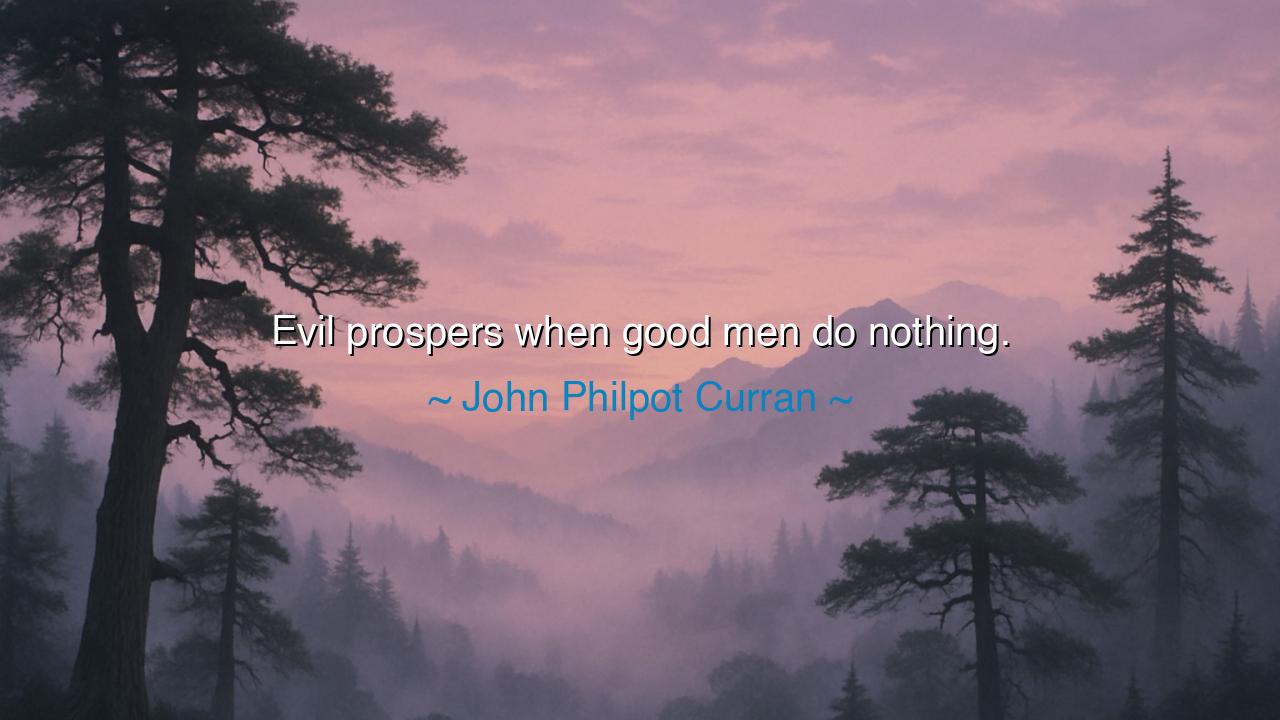
Evil prospers when good men do nothing.






John Philpot Curran, the fiery Irish orator and defender of liberty, gave to the ages these immortal words: “Evil prospers when good men do nothing.” Spoken in a time of tyranny and unrest, his warning rings like a trumpet across centuries. For he reminds us that the triumph of wickedness is not always the work of the mighty villain, but often the silence of the righteous. It is not only the cruelty of the oppressor that darkens the earth, but the inaction of those who might have stood against it.
For what is evil, if not the corruption of power, the betrayal of justice, the cruelty of the strong against the weak? Yet evil by itself is fragile, for it feeds upon fear and thrives only when left unchecked. A single voice of truth, a single act of courage, can wound it deeply. But when good men turn away, when they fold their hands and close their lips, evil spreads like a plague, filling the vacuum left by their silence. Thus Curran’s teaching: that inaction is itself a form of consent, and that neutrality in the face of injustice is a cloak for cowardice.
History is filled with examples that prove his wisdom. In the 1930s, when fascism rose in Europe, many who despised it chose silence, believing it would fade or that it was not their fight. Their inaction allowed the tyrant to grow bold, until his armies swallowed nations and his cruelty devoured millions. Had good men spoken earlier, had they acted before the darkness spread, much suffering might have been spared. Their silence was not neutrality—it was permission.
Yet there are also tales of those who did not remain idle. Consider the American Civil Rights Movement. For centuries, injustice prospered in silence, until men and women—ordinary and extraordinary—stood up. Martin Luther King Jr., Rosa Parks, John Lewis, and countless unnamed souls broke the chain of inaction. They marched, they spoke, they resisted. And though beaten, imprisoned, and mocked, they refused to “do nothing.” In their courage, Curran’s words were answered: evil was challenged, and justice advanced.
The lesson is eternal: every man and woman is confronted in life with moments of decision. To speak or to remain silent. To act or to turn away. The world may tell you that your voice is small, your action insignificant. But it is not so. For the silence of one multiplies into the silence of many, and the courage of one sparks the courage of a multitude. To do nothing is to strengthen the oppressor. To act, even in small ways, is to resist the flood of evil.
Therefore, O listener, take this teaching into your heart: never imagine that inaction is harmless. When you see cruelty, speak. When you witness injustice, act. When the weak are oppressed, stand beside them. Even if you cannot end the evil, you can wound it; even if you cannot silence the lie, you can refuse to repeat it. Your responsibility is not to change the whole world, but to refuse to surrender your portion of it to the powers of darkness.
Practical action flows from this truth: support those who suffer, vote with integrity, speak truth in your workplace, teach your children the value of courage. Do not let fear of ridicule, or comfort in safety, rob you of your duty. For if good men do nothing, they become the unwitting allies of evil. But if they rise, even trembling, they become the guardians of justice.
So let Curran’s words echo through the generations: “Evil prospers when good men do nothing.” Let it be a call to vigilance, a warning against apathy, and a summons to courage. For evil prospers only in silence, but when the righteous stand and speak, even the darkest night must give way to dawn.






AAdministratorAdministrator
Welcome, honored guests. Please leave a comment, we will respond soon